New virtual issue | Accountability in Public Administration: Consistent Challenges and New Terrain
This virtual issue of the Journal of Public Administration Research and Theory focuses on accountability, a central concern in the field of public administration. The nine articles address three central accountability questions: Who is accountable to whom? For what? And how is this best ensured? The articles highlight enduring challenges that surface in public accountability processes, including: the limited capacity of government to exercise effective oversight, the multiple expectations governing public accountability relationships, and the effectiveness of different approaches to ensuring accountability in the public sector.
The Thinking State: Accountability, Behavior and Centrifugal Pressure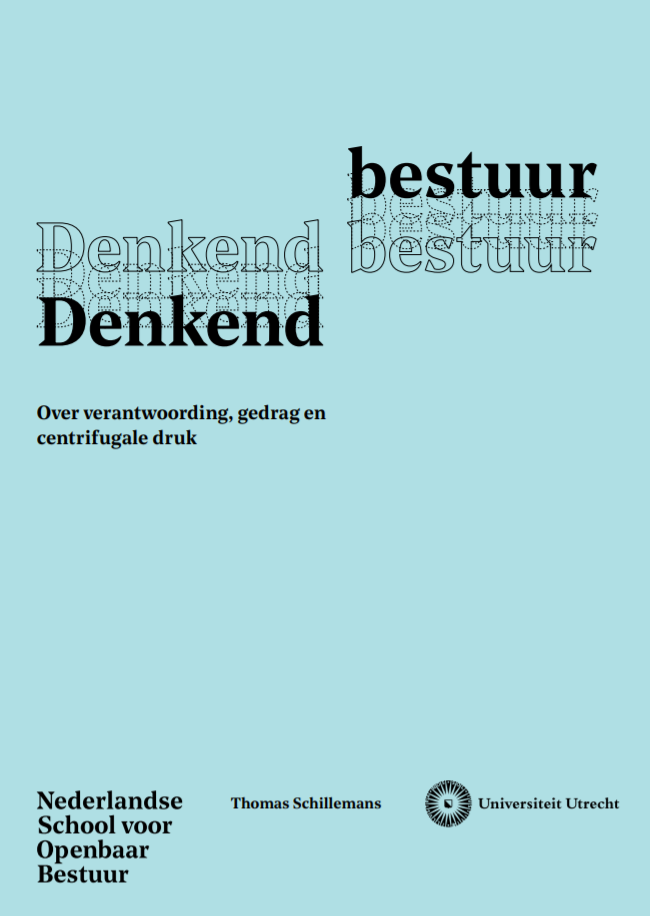
Publication of the inaugural lecture of Thomas Schillemans
On October 16, Professor Thomas Schillemans delivered his inaugural lecture for accepting the position of professor in the faculty of Law, Economics and Governance of Utrecht University. As a result, a book edition of ‘The Thinking State’ has been published.
To see the publication, click here (in Dutch)
Lessons from five decades of experimental and behavioral research on accountability: A systematic literature review
New publication in the Journal of Behavioral Public Administration
In the newest CPA journal publication Marija Aleksovska, Thomas Schillemans & Stephan Grimmelikhuijsen synthesize the empirical evidence on the effects of accountability mechanisms investigated in 266 experiments in the behavioral sciences – almost half a century of research. This interdisciplinary and comprehensive systematic literature review provides an extensive analysis of experimental insights by 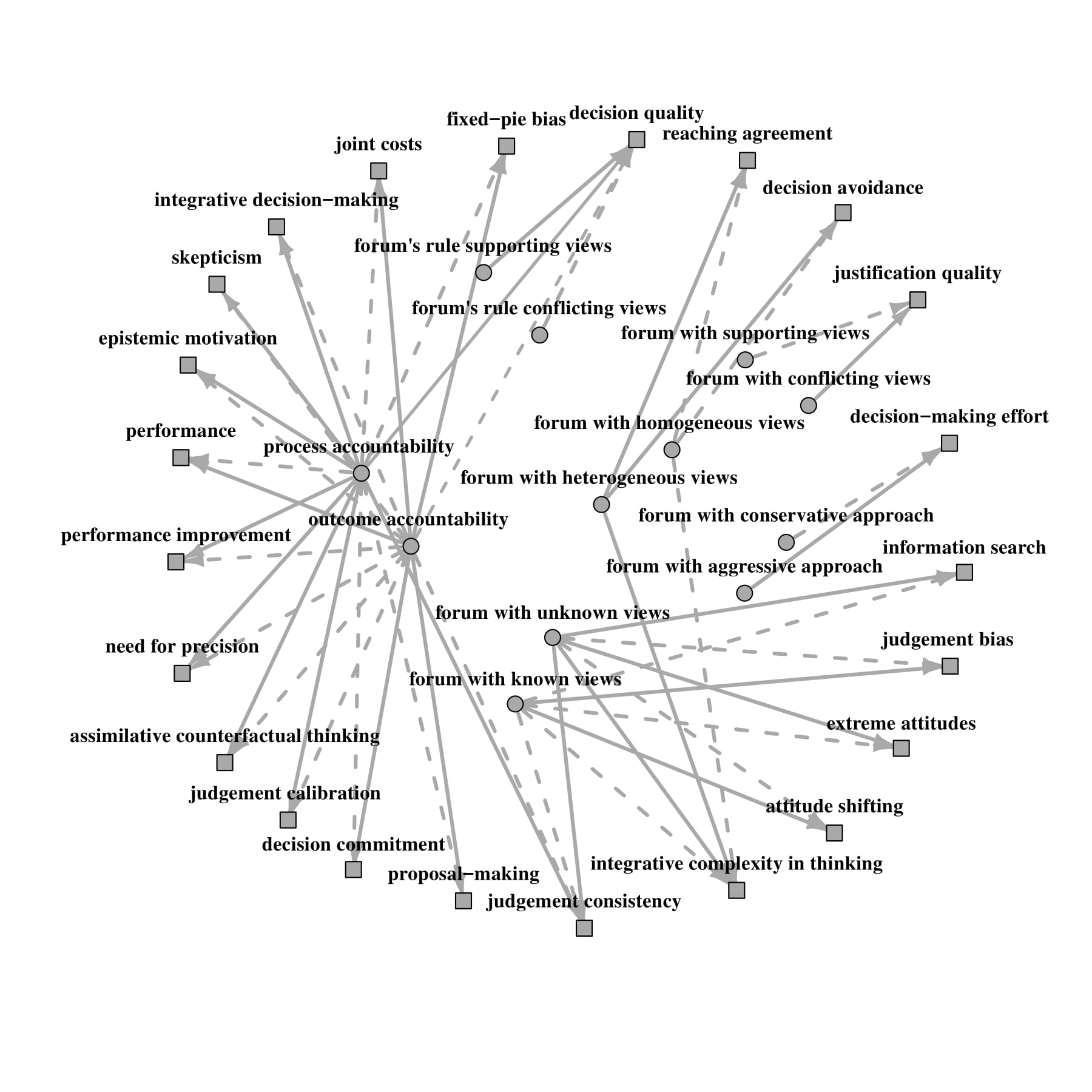 analyzing four underlying themes in the literature – the effects of accountability on decision making, behavior and outcomes; and effects of specific characteristics of accountability mechanisms. Aleksovska et al. identify a range of well investigated and confirmed effects, but also point out to deficiencies and problems in the existing accountability literature. Thereby, the authors outline a future research agenda to integrate methodological and substantive insights from behavioral sciences into public administration – extending existing findings to the specific public sector context, a balanced assessment of negative and positive accountability effects and, finally, focusing on the multiple design elements of accountability.
analyzing four underlying themes in the literature – the effects of accountability on decision making, behavior and outcomes; and effects of specific characteristics of accountability mechanisms. Aleksovska et al. identify a range of well investigated and confirmed effects, but also point out to deficiencies and problems in the existing accountability literature. Thereby, the authors outline a future research agenda to integrate methodological and substantive insights from behavioral sciences into public administration – extending existing findings to the specific public sector context, a balanced assessment of negative and positive accountability effects and, finally, focusing on the multiple design elements of accountability.
To see the publication, click here
Sjors Overman’s presentation at the OECD
Sjors Overman was invited to the OECD Strategic Education Governance Advisory Group meeting on September 24-25. He presented the latest findings from the CPA project at this workshop to OECD analysts, top-level policy makers and scholars on accountability. The workshop discussed the state-of-the-art in theory and practice of accountability in education.

To see the slides, click here
Meike Bokhorst, Sjors Overman & Thomas Schillemans win CCV-grant for research on “The Autumn of the Patriarch”
Several managers in housing corporations, educational and health care organizations have in recent years been found to exhibit problematic, if not fraudulent, behaviors. These were often powerful managers (‘patriarchs or matriarchs’) with long tenure, operating with too little checks and balances and accountability, appointing friends and marrying ‘trophy wives’. After the crisis materializes, many people often cl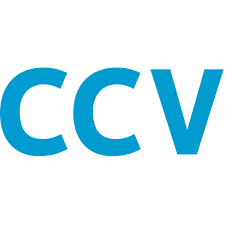 aim that they ‘saw it coming’. But what are the signs of managerial decline, of the autumn of the patriarch, in the Dutch public sector? This project will analyze reports of incidents, interview participants and survey managers to identify the early warning signs of managerial decline.
aim that they ‘saw it coming’. But what are the signs of managerial decline, of the autumn of the patriarch, in the Dutch public sector? This project will analyze reports of incidents, interview participants and survey managers to identify the early warning signs of managerial decline.
For more informatie, click here
Inaugural lecture of Thomas Schillemans | The Thinking State
Professor Thomas Schillemans gave his inaugural lecture on 16 October for accepting his position as professor in the faculty of Law, Economics and Governance of Utrecht University, with a special interest in Accountability, Behaviour and Governance. He was appointed in this position on 1 July 2018 by the Executive Board of Utrecht University. In the lecture he addressed ‘The Thinking State: Accountability, Behavior and Centrifugal Pressure’
His chair, placed under Utrecht University School of Governance (USG) partly at the behest of the Netherlands School of Public Administration, is affiliated with the interdisciplinary research theme Institutions for Open Societies at Utrecht University.
Transnational Organizations in Europe: Challenges for Accountability
New database and publication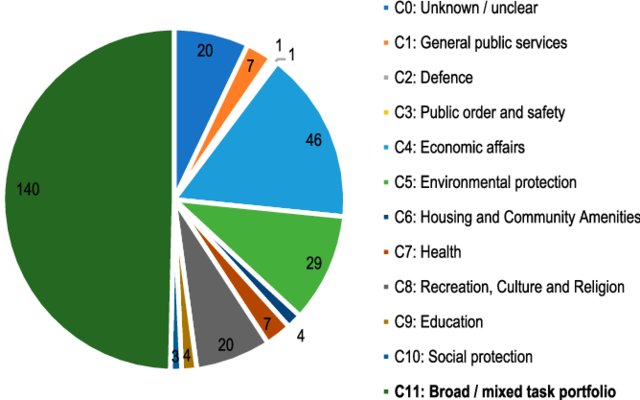
A new database of 370 transnational organizations – those which work across borders, often in border-crossing regions – in Europe has been developed. The database is being made open as valuable as a source of reference for journalists (or policy-makers and researchers) wishing for a more valid, in-depth view of what the EU is – rather than the endless discussion on Brexit and the perpetual ‘struggle’ between Brussels and national sovereignty. The database identifies salient issues of accountability and transparency which have not been addressed so far.
- Examples of these organizations include euregions, river-committees, functional airspace blocks but also CERN and the ECB.
- Those organisations are quite different yet they are comparable as they all work in more than 1 European country, yet not in all and not only in the EU, and they operate in part on EU funding or regulations.
To see the article, click here
To see the database, click here
Leeratelier Gedrag en Bestuur
Met trots presenteert de NSOB is samenwerking met de Universiteit Utrecht de nieuwe opleiding ‘Gedrag en Bestuur’. Een opleiding waarin gedrag(sbëinvloeding) en nudging in het openbaar bestuur centraal staan. In een gevarieerd programma worden beleidsmakers inspiratie, kennis en handvatten aangereikt voor het werken met kennis van gedrag.
Voor meer informatie, klik hier
Boekman Extra #12: Relaties tussen culturele organisaties en overheid
In deze editie van Boekman Extra is aandacht voor twee afstudeeronderzoeken aan de opleiding Bestuurs- en Organisatiewetenschap aan de Universiteit Utrecht. Elien Hagedoorn onderzocht hoe de Raad voor Cultuur musea beoordeelt. Thijs de Boer richt zich op de verantwoordingsrelatie tussen Nederlandse popfestivals en –podia en gemeentelijke overheden. Beide onderzoeken laten zien dat goede relaties tussen overheden en culturele instellingen investeringen, inspanningen en inlevingsvermogen van beide partijen vragen.
Om de editie van Boekman Extra te downloaden, klik hier
Themanummer Bestuursgericht toezicht in Bestuurskunde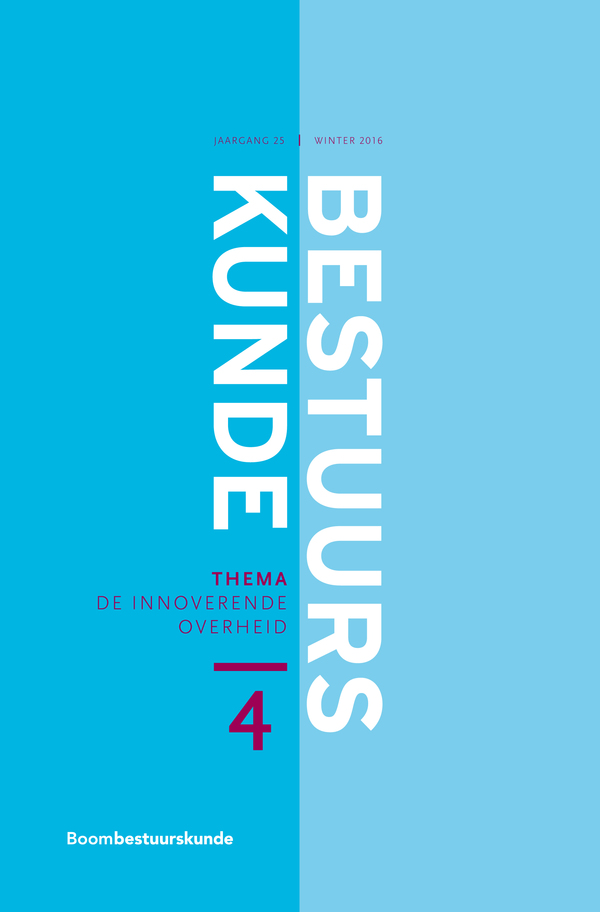
Van toezien op de kwaliteit van onderwijs, wonen en zorg naar toezicht op het bestuur van instellingen; werkt dat eigenlijk? Wat betekent dat concreet? En wat merken instellingen er eigenlijk van? Lees het in het nieuwe themanummer van het Nederlandstalig wetenschappelijk tijdschrift van de Vereniging voor Bestuurskunde
In dit themanummer staan onder andere de volgende artikelen:
Ontwikkeling van bestuursgericht toezicht in semipublieke sectoren
| Auteurs | Dr. Meike Bokhorst, Dr. Marieke van Genugten, Dr. Mirjan Oude Vrielink e.a. |
Hooggespannen verwachtingen van kwaliteitszorg, bestuurskracht en maatwerk
| Auteurs | Dr. Marlies Honingh, Prof. dr Melanie Ehren en Dr. Cor van Montfort |
| Auteurs | Dr. Annemiek Stoopendaal en Dr. Hester van de Bovenkamp |
Het wakend oog van de Autoriteit woningcorporaties onder de loep genomen
| Auteurs | Olga Verschuren Msc en Dr. Stefanie Beyens |
Empirische inzichten in jonge praktijken van bestuursgericht toezicht
| Auteurs | Prof. dr. Thomas Schillemans, Dr. Meike Bokhorst, Dr. Marieke van Genugten e.a |
Thomas Schillemans benoemd tot hoogleraar Verantwoording, gedrag en instituties
Met ingang van 1 juli is Thomas Schillemans benoemd tot hoogleraar Verantwoording, gedrag en instituties bij het departement Bestuurs- en Organisatiewetenschap (USBO) van de faculteit Recht, Economie, Bestuur en Organisatie. Thomas Schillemans wil de werking van verantwoording en toezicht in de publieke sector beter begrijpen én kwalitatief verbeteren – met behulp van inzichten en experimenten uit de gedragswetenschap.
Zijn leerstoel is bij USBO ondergebracht mede op initiatief van de Nederlandse School voor Openbaar Bestuur en verbonden met het interdisciplinaire onderzoeksthema Institutions for Open Societies van de Universiteit Utrecht.

‘Ik doe kennelijk iets wat aanspreekt,’ zegt Thomas natuurlijk. Maar vervolgens is het echt belangrijk om gewoon invulling aan de leerstoel te geven en je niet te laten afleiden door de leuke associaties van de titel zelf, want het past gewoon bij het soort werk wat we hier doen en dáár gaat het hier om.’Schillemans. ‘Ik ben buitengewoon trots op de titel
CONSOLIDEREN ÉN INNOVEREN
‘Ik ga consolideren én innoveren,’ aldus de kersverse hoogleraar, ‘Continueren van het onderzoek naar publieke verantwoording, want daarin zijn wij wereldwijd een van de trendsetters. We gaan ook vernieuwen, door het gebruik van gedragswetenschappelijke methodes en inzichten en experimenten om de werking van het verantwoordingsstelsel beter te begrijpen, onder meer in mijn vidi-project. Een ander deel van de innovatie zit hem in de samenwerking met de Nederlandse School voor Openbaar Bestuur (NSOB), de inbedding in Institution s for Open Societies (IOS) en samenwerking met andere vakgebieden, psychologen, juristen en anderen.
Bovendien willen we ook impact creëren door de interactie met professionals in de praktijk. Sinds kort ben ik decaan van het NSOB leeratelier toezicht en naleving en hier in Utrecht ben ik actief in een opleiding voor de toezichtssector onder leiding van Judith van Erp. Met collega’s van Rechtsgeleerdheid (onder andere Ivo Giesen) gaan we onderzoeken of we iets dergelijks ook bij rechtbanken kunnen gaan doen; allemaal grote, complexe organisaties met veel beoordelingsrisico’s.
Hopelijk kunnen we echt een bijdrage leveren aan het beter inrichten van de publieke sector, en toezichthouders en organisaties helpen beter te functioneren.
PSYCHOLOGIE IN DE PUBLIEKE SECTOR
Onze veronderstelling is dat de condities waaronder je je werk doet, beïnvloeden hoe je je taak uitvoert, en bijvoorbeeld of je verwacht dat dat effect gaat hebben. Zo is de zogenaamde ‘bevestigingsbias’ een cruciaal probleem voor toezichthouders (eigenlijk voor iedereen die anderen beoordeelt; dat geldt ook voor docenten!). Als je een vooringenomen beeld hebt, vind je snel bevestiging. Maar we weten ook dat als je de procedure wat verandert, de kans op die bevestigingsbias kleiner is. We gaan, voor een deel op basis van experimenten, proberen te begrijpen wanneer mensen daarin minder fouten maken, en zich serieus inzetten om goed te begrijpen wat er gebeurt.’
‘Het klinkt als een spannende belofte dat je iets met gedragskennis en psychologie kunt doen in de inrichting van bestuur en beleid. Ik ben er, zoals veel anderen, door geïnspireerd,’ zegt Schillemans. ‘Het bewijs dat we er in het onderzoek, onderwijs en executive onderwijs echt iets mee kunnen, moet echter nog worden geleverd. Er zit ongetwijfeld veel kaf tussen het koren – dat een beetje helpen scheiden, dat zou ik de komende jaren graag doen. Wat heb je er nou echt aan, welke inzichten levert het nou echt op en wat werkt er juist niet? Daarmee kunnen we hopelijk echt een bijdrage leveren aan het beter inrichten van de publieke sector, en toezichthouders en organisaties helpen beter te functioneren.
MEER INFORMATIE
Wilt u meer weten over Thomas Schillemans, kijk dan op zijn persoonlijke pagina.
Making Accountability Work!

Accountability is omnipresent and pervasive in the public sector. Public organizations are faced with a multitude of rules and expectations from various accountability forums, ranging from central government to audit institutions, regulatory agencies and, not in the least, pressures from (social) media and interest groups. Accountability can be a major source of despair and frustration. But accountability can also be effective and help organizations focus on what really counts. One key question is: when does accountability help managers in public organizations focus and perform?
The international workshop brought together an international research consortium with scholars from universities in Aarhus (Den), Bergen (No), Canberra (Aus), Gothenburg (Swe), Lausanne (Sui), Sheffield (UK) and Utrecht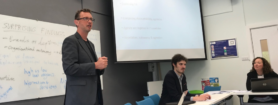 to discuss this question. A major finding was that the managers’ felt accountability – does (s)he expect accountability and does (s)he experience this as legitimate and expertise-based? – is key to our understanding (see also here).
to discuss this question. A major finding was that the managers’ felt accountability – does (s)he expect accountability and does (s)he experience this as legitimate and expertise-based? – is key to our understanding (see also here).
The relevance for policy makers was then discussed with representatives from various important policy making bodies, including the OECD, the Scientific Council for Government Policy, the Courts of audit from the Netherlands and the UK, the Swedish Trust-Reform, the UK Cabinet Office and various other governmental and public institutions. An important and stimulating finding was that stakeholder orientation towards citizens and hierarchical accountability towards government is not a zero sum game but can in fact reinforce each other.
The workshop is part of the vidi-project Calibrating Public Accountability and embedded in the IOS-stream Behavior and Institutions and was organized in collaboration with Matthew Wood (University of Sheffield)
Marija Aleksovksa and Lauren Fahy win ‘best paper giver awards’ at ECPR

At the recent ECPR-Joint Sessions in Nicosia, Marija Aleksovska and Lauren Fahy won the ‘best paper giver awards’ in the workshop on ‘Accountability and Reputation’ for their two outstanding paper presentations. The four panel chairs and the panel-discussant thought these two participants made an exceptional contribution justifying this special honor. The two winners have received their award and an accompanying bottle of Cypriot wine.
A first look at Accountable Governance across 7 countries
The international CPA Team of researchers, lead by Thomas Schillemans, have brought together an initial report presenting preliminary findings of an international accountability survey, which has been carried out in public organisations across 7 countries.
For more details on the report and other publications, click here
To see the report, click here
Call for papers: Accountability and Reputation
ECPR Joint Sessions 2018 Nicosia
This workshop will bring together an international group of scholars to discuss the relationship between accountability and reputation in the public sector. Accountability has gained a vast amount of scholarly, as well as public attention over the last years. The recent attention for behavioral aspects of accountability has furthered our understanding of the importance of accountability mechanisms: how can accountability instruments influence political and managerial behavior? At the same time, scholars have begun to theorise the importance of organizational reputation in accountability relations. In this workshop, we will discuss the relation between accountability and reputation, and accountability and performance, in further depth. An important contribution of the current workshop is the discussion of empirical evaluations of the relationships between accountability and performance and reputation.
Conference | 10-14 April 2018
Deadline paper proposals | 6 December 2017
Workshop Directors
Madalina Busuioc
Leiden University – Faculty Governance and Global Affairs
Sjors Overman
Utrecht University School of Governance
Thomas Schillemans
Utrecht University School of Governance
Matthew Wood
University of Sheffield
Launch of Utrecht University Institutions Stream Behaviour, Public Policy and Administration
With Roy Baumeister, Lars Tummers, Denise de Ridder & Joel Anderson
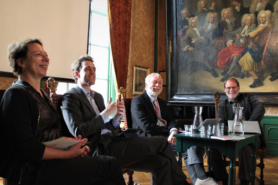
Friday the 19th of May 2017, marked the official launch of the new Center for Advanced Studies in Behavior, Public Policy & Administration at Utrecht University, closely linked to the strategic theme Institutions for Open Societies. Key speaker was the acclaimed professor Roy Baumeister, one of the world’s most prolific and influential psychologists.
Topic of discussion: What Good are psychological insights for public policy and administration?
Along dr. Lars Tummers, dr. Joel Anderson, and professor Denise de Ridder in the invaluable role of discussant, participating representatives ranged from the The Netherlands Scientific Council for Government Policy (with a recent report on psychology and public policy), policy advisors from the municipality of Utrecht and Rotterdam, and Utrecht University academics from the faculties Humanities, Social and Behavioural Sciences, and Law, Economics and Governance.
Chairing the meeting, dr. Thomas Schillemans (Utrecht School of Governance) sketched the envisioned contours of a network consisting of scholars, practitioners and other societal stakeholders.
Ambitions are grand as the centre will work to develop sound policy advice, develop educational opportunities and strengthen research around societal issues by combining insights from psychology, public administration, and other related field.
Finally, the day marks the start of a tradition to invite tantalising honorary guests with whom to exchange insights and views, an ambition which will bring academia and practise a considerable step closer together.
Click here to find more information about the launched center.
Workshop Professional Judgment
Understanding how auditors process information
21 March 2017
By Raphael Debets, attaché in the private office of Alex Brenninkmeijer, ECA Member
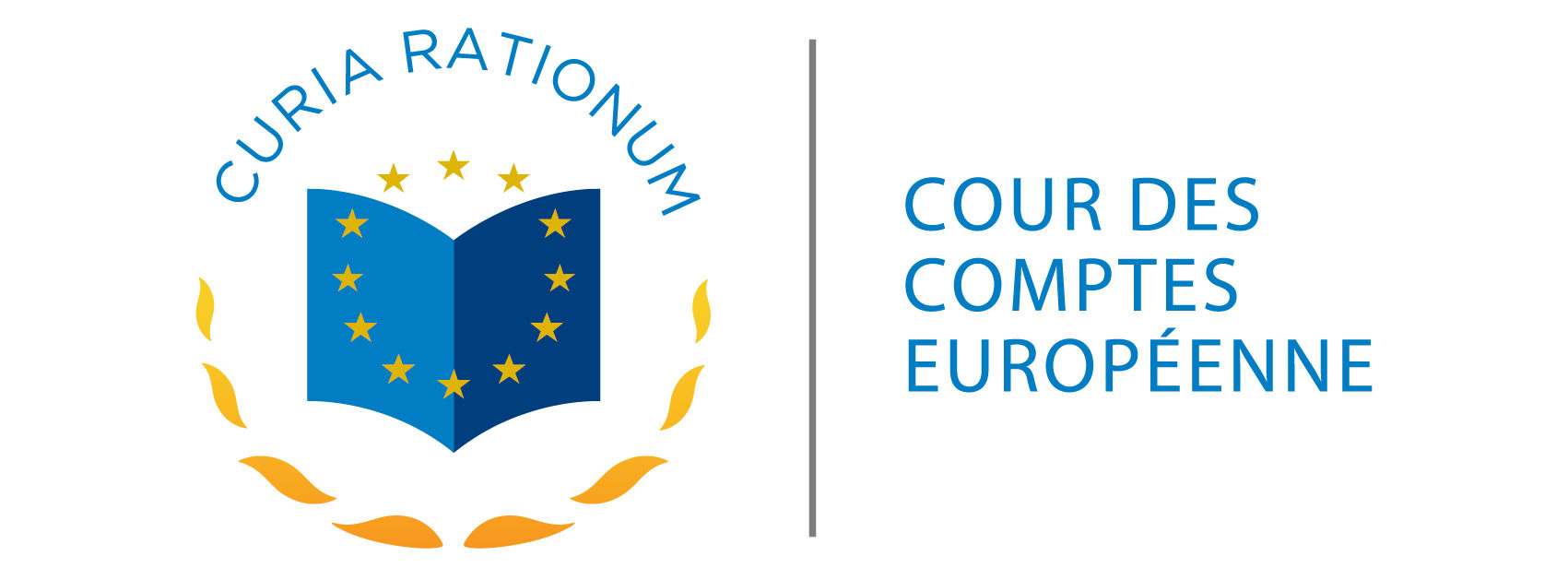
A unique situation: More than 30 ECA colleagues carried out a case and real-time survey in the ECA’s premises. All were unprepared, as part of the research, trying to get to grips with the relation between accountability and judgement; what is professional judgement?
Professional judgment is important in the public sector, where a variety of ‘assessors’ – such as auditors, evaluators, inspectorates and many others – operate and pass judgment on public organizations. Important yet difficult. Research has shown many biases and risks in professional judgement. During a two-hour workshop, ECA Member Alex Brenninkmeijer introduced dr. Thomas Schillemans (Utrecht University School of Governance). Dr. Schillemans tested a special case of professional judgment with more than 30 auditors from the European Court of Auditors. The same test will also be done in other organizations.
This research aims to further understand how professional judgment works for performance auditors and public sector evaluators and what factors contribute to its success, drawing on insights from auditing, psychology and public administration.
This should lead to new insights in how professional assessors process information and come to their judgment. It will shed light on pertinent questions such as: when do assessors process more or less information? When are they more likely to make errors and, also, do auditors from the same organization weigh the same evidence in similar ways?
Some possible answers were discussed in an informal gathering during the lunch offered to the hard working and enthusiastic participants.
The real answers to these questions will follow in autumn this year when Dr Schillemans will present his findings to all interested staff, here in Luxembourg.
Masterclass Professional Judgment Stichting Visitatie Woningcorporaties Nederland
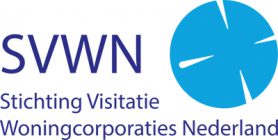
Tweemaal per jaar organiseert de Stichting Visitatie Woningcorporaties Nederland een Masterclass voor visitatoren. De Masterclass in november zal gaan over een kernkwaliteit van visitatoren: professional judgment.
Professional judgment is het vermogen om tot een afgewogen oordeel te komen, rekening houdend met de specifieke, lokale situatie. Daarbij is ‘goed oordelen’ nog iets anders dan ‘effectief oordelen’: komt de boodschap ook áán, kúnnen betrokkenen (corporatie, huurders, gemeente) er echt iets mee, zet het hen in beweging?
Dr. Thomas Schillemans (Universiteit Utrecht), gepromoveerd op o.a. visitaties, reikt inzichten en ervaringen aan. Uit literatuur, van elders, maar deels ook gebaseerd op nieuw onderzoek naar visitaties van woningcorporaties.
Klik hier voor meer informatie over de Masterclasses voor visitatoren
Stimulating Launching Event Calibrating Public Accountability Project
February 11th, 2016
On Thursday February 11th the opening event for the research project Calibrating Public Accountability from Dr. Thomas Schillemans took place. Arno Visser, President of the Dutch National Audit Office, highlighted the societal relevance of accountability research during his keynote speech.
Visser stated that a cloud has been cast on the relationship between tax expenses and accountability. Our tax money is collected on the national level and subsequently distributed to other actors. ‘Accountability’ is often forgotten in this distribution process. Central government for instance allocates tasks and budgets to municipalities, who use these resources according to their own insights and needs. This may result in differences between municipalities. Who, then, is accountable for these differences: national government or local governments? The National Audit Office wants to be able to explain transparently which policies are financed by tax money and whether those policies have been carried out satisfactorily. This is impossible without appropriate accountability mechanisms.
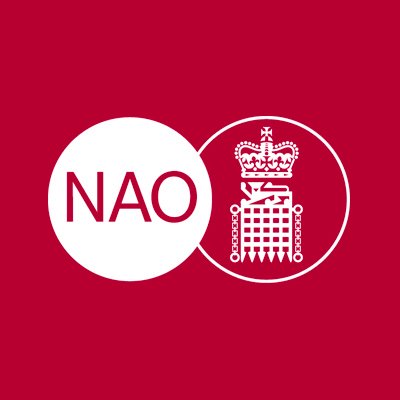
Accountability is a key concept in democratic governance. Prior research is often descriptive and normative. The Calibrating Public Accountability Research project aims to innovate both public accountability research as well as practices of public accountability. In order to do this, the project is anchored in networks of international scholars and (primarily) Dutch public sector organizations. It ultimately aims to make accountability more effective in improving decision-making in various public sector agencies.
CPA-model published in Public Management Review
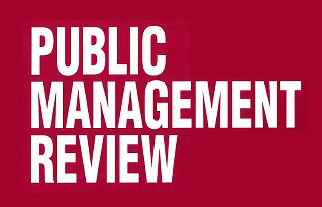
Public Management Review published the paper Calibrating public sector accountability. The paper develops a theoretical model, based on psychological insights, that can be used to analyze and devise accountability mechanisms for the public sector. The CPA-model is a crucial cog in our quest for calibration: it promises to help policy makers to optimize and improve accountability and governance systems.
For the article, click here

